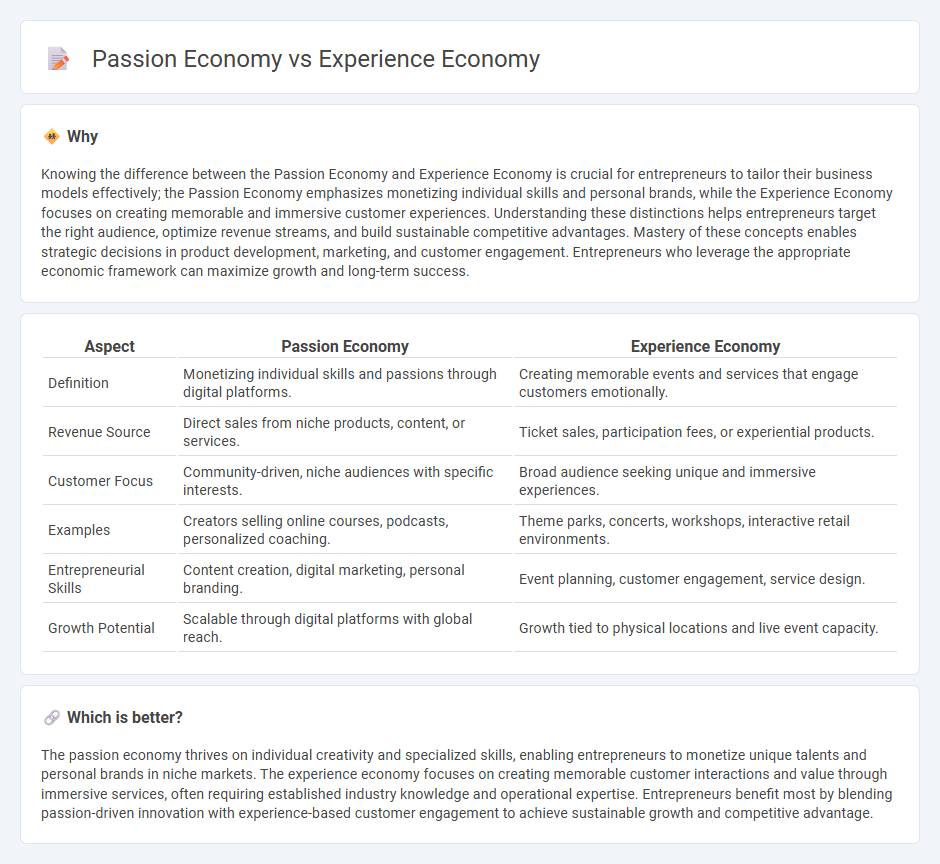
Entrepreneurship thrives at the intersection of the passion economy and the experience economy, where individuals leverage personal interests and curated experiences to create value. The passion economy emphasizes unique skills and authentic content creation, while the experience economy focuses on delivering memorable, personalized customer interactions that drive loyalty. Explore how these economic models reshape entrepreneurial strategies and unlock new opportunities.
Why it is important
Knowing the difference between the Passion Economy and Experience Economy is crucial for entrepreneurs to tailor their business models effectively; the Passion Economy emphasizes monetizing individual skills and personal brands, while the Experience Economy focuses on creating memorable and immersive customer experiences. Understanding these distinctions helps entrepreneurs target the right audience, optimize revenue streams, and build sustainable competitive advantages. Mastery of these concepts enables strategic decisions in product development, marketing, and customer engagement. Entrepreneurs who leverage the appropriate economic framework can maximize growth and long-term success.
Comparison Table
| Aspect | Passion Economy | Experience Economy |
|---|---|---|
| Definition | Monetizing individual skills and passions through digital platforms. | Creating memorable events and services that engage customers emotionally. |
| Revenue Source | Direct sales from niche products, content, or services. | Ticket sales, participation fees, or experiential products. |
| Customer Focus | Community-driven, niche audiences with specific interests. | Broad audience seeking unique and immersive experiences. |
| Examples | Creators selling online courses, podcasts, personalized coaching. | Theme parks, concerts, workshops, interactive retail environments. |
| Entrepreneurial Skills | Content creation, digital marketing, personal branding. | Event planning, customer engagement, service design. |
| Growth Potential | Scalable through digital platforms with global reach. | Growth tied to physical locations and live event capacity. |
Which is better?
The passion economy thrives on individual creativity and specialized skills, enabling entrepreneurs to monetize unique talents and personal brands in niche markets. The experience economy focuses on creating memorable customer interactions and value through immersive services, often requiring established industry knowledge and operational expertise. Entrepreneurs benefit most by blending passion-driven innovation with experience-based customer engagement to achieve sustainable growth and competitive advantage.
Connection
The passion economy thrives on individuals turning their unique skills and interests into monetizable ventures, while the experience economy emphasizes creating memorable and personalized customer interactions. Both economies drive entrepreneurship by encouraging business models that value authenticity, creativity, and consumer engagement. Entrepreneurs capitalize on these trends by designing products and services that reflect personal passion and deliver immersive, meaningful experiences.
Key Terms
Personalization
The experience economy emphasizes creating memorable, immersive experiences tailored to individual preferences, driving customer engagement and satisfaction through personalized services and products. The passion economy centers on empowering creators and entrepreneurs to monetize their unique skills and passions directly, offering highly specialized and customized content or services. Explore how personalization transforms both economies by enhancing user connection and value.
Authenticity
The experience economy emphasizes creating memorable and immersive customer interactions, while the passion economy revolves around individual creators monetizing their unique skills and passions. Authenticity plays a critical role in both economies, as genuine engagement fosters trust and deeper connections with audiences. Explore how authenticity drives success in these evolving economic models to enhance your approach.
Value Creation
Experience economy centers on creating memorable events that engage consumers emotionally and physically, enhancing brand loyalty and customer satisfaction. Passion economy leverages individual creators' unique skills and interests to deliver personalized, high-value content or services, promoting authentic connections and niche market growth. Explore how these economies transform value creation and unlock new opportunities for businesses and creators.
Source and External Links
The Experience Economy: What It Is and Why It Matters - WXO - The Experience Economy represents a shift where businesses create value not just by selling goods or services, but by engaging customers in memorable, meaningful experiences that transform commodities into rituals, emphasizing that experiences are the future of business value creation.
Making memories: the rise of the experience economy | Barclays - Spending on experiences is growing as it boosts happiness and wellbeing more than physical goods, with the experience economy contributing significantly to the UK's economy and expected to continue growing steadily.
What is the Experience Economy? - Localist - The experience economy refers to an economic model where the value lies in the effect experiences have on people's lives, combining goods and services into memorable events that are more valuable than the sum of their parts.
 dowidth.com
dowidth.com